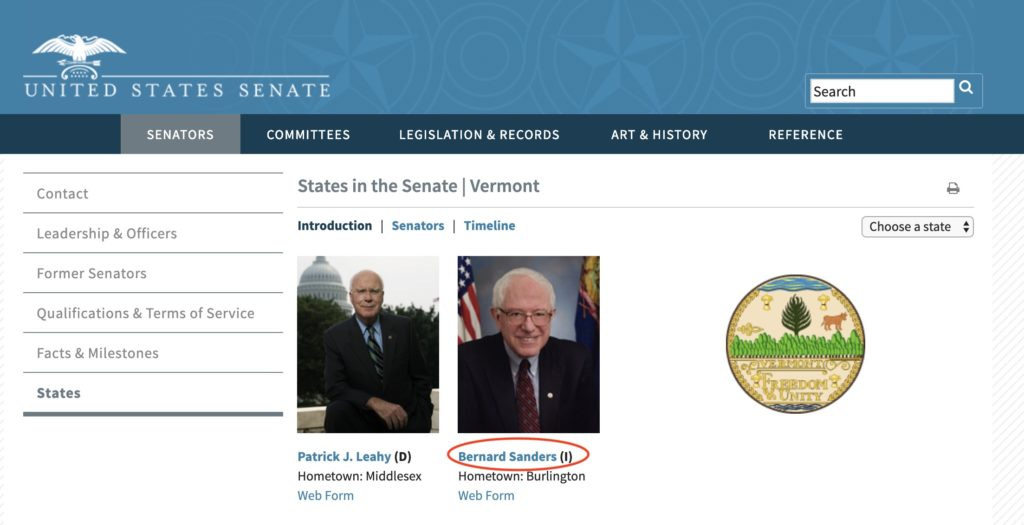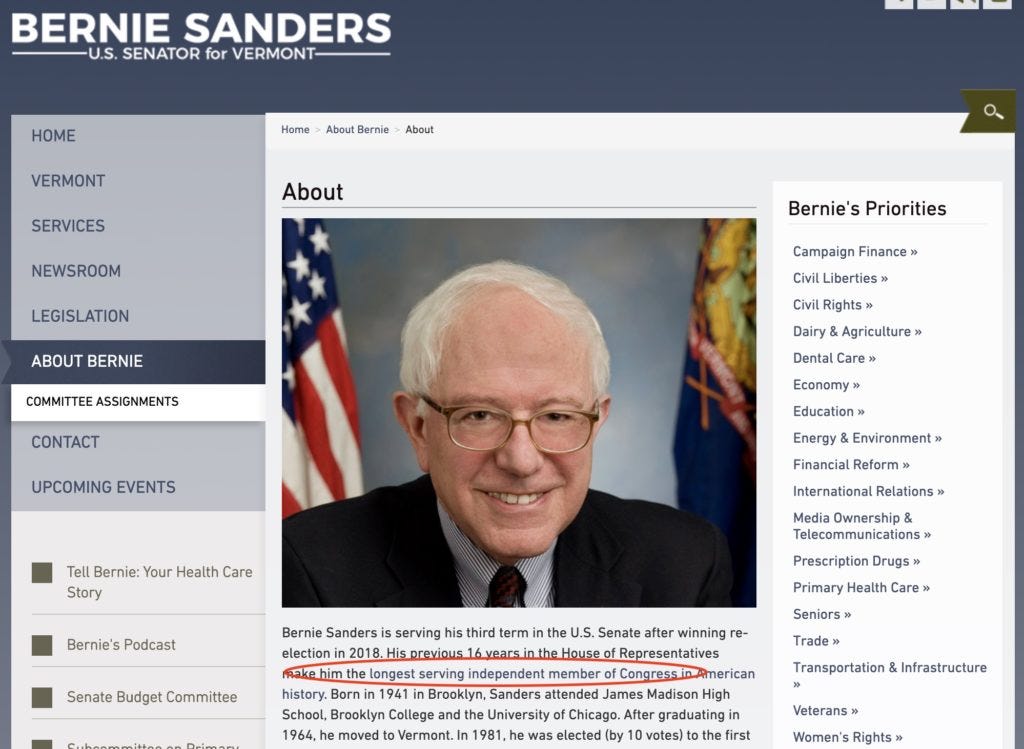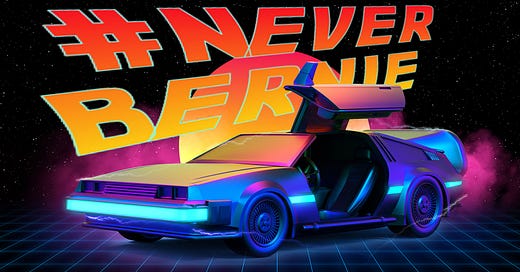On a debate stage late in July, then-South Bend Mayor Pete Buttigieg defended Democratic candidates seeking to unabashedly tout their progressive bona fides.
"It's time to stop worrying about what the Republicans will say,” said Buttigieg. “It's true that if we embrace a far left agenda, they're going to say we're a bunch of crazy socialists. If we embrace a conservative agenda, you know what they're going to do? They're going to say we're a bunch of crazy socialists. Let's stand up for the right policy, go up there and defend it."
Democrats seem to have taken his advice to heart. Seven months later, they’re close to nominating an actual socialist.
That possibility got even more real on the South Carolina debate stage Tuesday night, as Sanders swatted away microwaved attacks from his competitors. In a disorganized, confusing debate, the bombastic Sanders actually seemed quite at home.
Of course, Mayor Pete is not quite as sublime as he was in July. He has now taken to warning America of the dangers of voting for the Bolshevik Doc Brown, whose DeLorean is set to take the country back to the days when socialism still had promise. (Incidentally, to carry the metaphor further, Donald Trump could do worse than nicknaming Buttigieg “Marty McFly,” especially since the character Biff Tannen was based, in part, on Trump himself.)
“Senator Sanders believes in an inflexible, ideological revolution that leaves out most Democrats, not to mention most Americans,” Buttigieg said on the night of the Nevada caucuses, in which Mayor McFly finished a distant third, “Before we rush to nominate Senator Sanders as our one shot to take on this president . . . let’s take a sober look at the consequences—for our party, for our values, and for those with the most at stake.”
We’ve heard those sorts of warning before. In many ways, the Democrats have found their way into a campaign similar to the Republican race in 2016, in which a loud-mouthed septuagenarian is rolling through the primaries while other, more moderate, candidates split the vote that should be stopping him.
But there is one very distinct different between 2016 and 2020: while a distinct #NeverTrump cabal formed to oppose the reality star who was taking over the GOP, it seems unlikely that there’s going to be a #NeverBernie movement within the Democratic ranks.
The #NeverTrump movement that gained strength in 2016 opposed Trump on several grounds. The big one, of course, was simply that Trump was unfit for office: an indecent human being, prone to childish outbursts and embarrassing public statements who could not be trusted as the nation’s chief executive.
But Trump also held many positions that were anathema to the Republican Party of 2015 (for instance, the embrace of tariffs and trade protectionism and the refusal to even consider reforming the entitlement system). As a recent convert to Republicanism, Trump didn’t even pretend to know the GOP talking points: during the campaign, he said that if abortion were outlawed, women would be put in jail for having abortions. (The Republican view has always been that if abortion were to be criminalized, it would be the doctors who performed the procedure, not their patients, who were subject to prosecution.) He talked about “Two Corinthians” and how his favorite Bible verse was “an eye for an eye.”
The argument from NeverTrumpers was: Why should we hand control of our party to a man who shares none of its values?
Expect no such resistance from the anti-Bernie crowd.
For one, despite his bombastic hand-waving and Trotsky-adjacent rhetoric, Sanders appears to be a decent-enough human being. He says crazy things—for instance, excusing the actions of murderous dictators like Fidel Castro while praising Cuba’s literacy and universal healthcare programs. And in the past he has supported political elements that were literally anti-American. And he stands at the head of an online mob that attacks anyone who dares to question him.
But at least he knows what the nuclear triad is and the process by which a bill becomes a law. He can put sentences together in a coherent manner and has a basic understanding of how government functions.
And there’s no video of him gawking at underage girls!
So at the most basic level of the lowest possible bar for “fitness for office,” Bernie passes.
Or rather: He passes where the bar is now. By pre-Trump standards, Bernie’s long history of terrible political judgment would have made him completely unfit for the presidency.
But the past is a foreign country.
Which leaves the policies and party affiliation. Sanders’ positions on subjects such as healthcare, the environment, workers’ rights, and college affordability are outside the Democratic Party’s mainstream, but they don’t appear to be driving away party members in droves.
According to a recent Kaiser Family Foundation poll, 74 percent of Democrats favor a Sanders-style Medicare for All plan, even though it would eliminate their private insurance and move them to a government plan. A YouGov poll conducted last year shows a plurality (49 percent to 36 percent) of voters in 42 congressional swing districts support the preposterous Green New Deal. A September 2019 Hill-HarrisX poll found that 58 percent of registered voters support free college.
But the important thing is that unlike Trump, who took many positions closer to center than where Republicans were, Bernie is taking positions further out to the left.
Taking a position closer to the opposing party can create unforgivable tensions. Moving further out to your party’s own fringe might be inadvisable or unpleasant. But it will never be a deal-breaker. No enemies to the left, comrade!
Then there’s the question of whether or not Democrats will hold it against Bernie that he isn’t actually a Democrat.
Sanders didn’t identify as a Democrat until he ran for president the first time, in 2016. His official Senate website still lists him as an independent, even as he leads the Democratic delegate race. He’s literally not even a Democrat right now!


Why don’t Democrats care about this? Who can say. You would think that, after watching what’s happened to the Republican Party that they’d be eager to defend their party from a hostile takeover from a non-Democrat.
Then again, you’d think a lot of things these days.
Which leaves only one argument for a #NeverBernie movement to hang itself on: electability.
Just as NeverTrump Republicans in 2016 warned—incorrectly, as it turned out—that the Republican Party had nominated the only candidate who could lose to Hillary Clinton many Democrats worry that Trump will eviscerate Sanders in a Mondale-style rout and, as a bonus, cost them the House.
But electability is a thin reed. Almost all national polling shows Sanders beating Trump. Maybe this is a mirage—the data is certainly more complicated than it looks. But maybe not. Another one of the lessons 2016 taught us is that even low probability events happen all the time.
In mere days, Super Tuesday may set up a dynamic where it is impossible for any other candidate to win a delegate majority. The Klobuchars, Warrens, and Bidens of the world will be told that they have to get out of the race, for the good of the party.
At which point the only way to stop him will be for Mayor Pete to find a souped-up DeLorean and start the race over.




